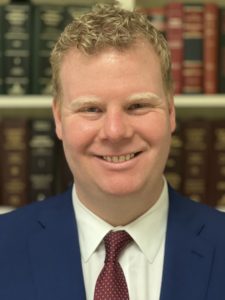By Ben Gettinger
Milford-Orange Probate Court

Ben Gettinger
A few high-profile cases have recently brought public attention to conservatorships and the potential for conservatorship abuse or overreach. Connecticut probate courts have a number of procedures and safeguards in place to prevent, identify and remedy such abuse or overreach. This column will highlight some of the procedures and safeguards in place for involuntary conservatorships.
In Connecticut, all conservatorship hearings are recorded and all witnesses are put under oath. The initial hearing cannot take place unless the subject of the involuntary conservatorship hearing (known as the “respondent”) has at least a 10-day notice. The notice of the hearing must be served on the respondent to confirm the notice requirement has been met. The hearing cannot take place unless the hearing notice was properly and timely served.
In general, the hearing cannot take place unless the respondent was examined by a physician no earlier than 45 days prior to the hearing. The physician must submit a report detailing their medical findings and answer a number of questions about the respondent to assist the court in determining if a conservatorship is appropriate.
Unlike in some states, the respondent is guaranteed the opportunity to have an attorney throughout the entire involuntary conservatorship process. If the respondent is indigent or otherwise cannot afford an attorney, the attorney will get paid through the probate court administration fund. The attorney will advocate on behalf of the respondent at the initial hearing and throughout the process if an involuntary conservatorship is ordered.
If a conservatorship is ordered, it will be subject to court review in a year and then every three years. The purpose of the review is to determine if the conservatorship is still appropriate. In addition, the conservator of the person must file a conservator’s report at least once a year. The conservator of the estate must file a financial report after the first year and then every three years and must keep all supporting documentation, such as bank statements, invoices and canceled checks.
If a conservator of the estate is ordered, the court will generally order a bond if the total assets are over $20,000 or there is over $10,000 in unrestricted assets. The conservatorship may also be subject to a random financial audit.
There are also restrictions on the conservator’s powers. For example, a conservator must get court approval before placing the respondent in an institution for long term care, changing the respondent’s residence, terminating the respondent’s lease, disposing of the respondent’s furnishing, selling the respondent’s real estate or consenting to psychiatric medication.
Finally, the respondent has the right to try to terminate the conservatorship. The respondent may request termination at any time. A hearing must be held within 30 days of the request. The respondent does not need to submit medical evidence. The respondent also has a lower burden of proof than the initial burden of proof needed to grant the conservatorship. The burden of proof to terminate is a “preponderance of the evidence” that the respondent is capable, whereas the burden of proof needed to grant an involuntary conservatorship is “clear and convincing evidence” that the respondent is incapable.
Even with these procedures and safeguards in place, involuntary conservatorships in Connecticut are not infallible. Please feel free to call the Milford-Orange Probate Court at 203-783-3205 if you have any concerns, suggestions or general questions about conservatorships.
Ben Gettinger is the probate judge for the Milford-Orange Probate Court.